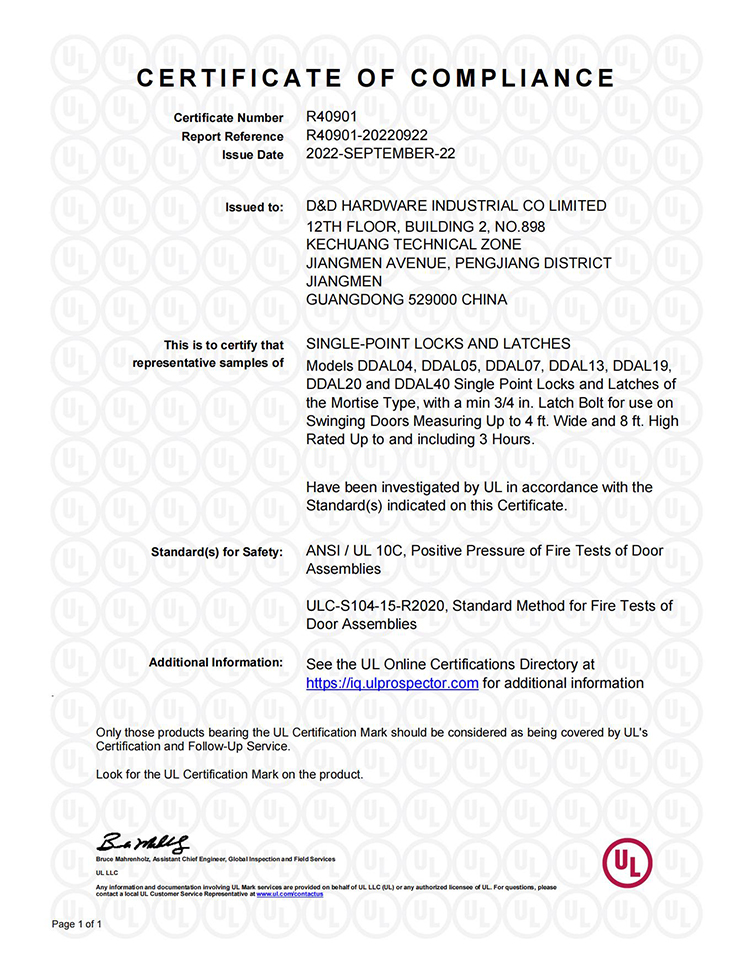Views: 0 Author: Site Editor Publish Time: 2025-03-03 Origin: Site

In the ever-evolving realm of commercial security, the role of a commercial door lock cannot be overstated. Factories, distributors, and channel partners all recognize the critical need for robust locking mechanisms that safeguard assets and ensure operational continuity. As threats become more sophisticated, understanding the security features embedded within these locks is essential for making informed decisions. This article delves into the intricate security aspects of commercial door locks, providing a comprehensive analysis tailored for industry professionals seeking to enhance their security infrastructure.
Commercial door locks are engineered to meet the rigorous demands of high-traffic environments. Unlike residential locks, they are constructed with enhanced durability and advanced security features to deter unauthorized access. The selection of an appropriate lockset is pivotal, impacting not only security but also compliance with industry standards and regulations.
The diversity of commercial settings necessitates a range of lock types, each designed for specific applications and security levels.
Mortise locks are a prevalent choice in commercial buildings due to their robustness and versatility. These locks are installed within a pocket, or mortise, cut into the door edge. The complexity of a mortise lock provides enhanced security, making it resistant to tampering and forced entry.
Cylindrical Locks
Cylindrical locks, also known as bored locks, are easier to install but offer varying degrees of security. They are suitable for interior doors or areas with lower security requirements. Although not as robust as mortise locks, advancements have improved their security features.
When evaluating commercial door locks, several critical security features must be considered to ensure optimal protection against unauthorized access and potential breaches.
The materials used in the construction of door locks significantly impact their security capabilities. High-grade metals, such as stainless steel or brass, are commonly used due to their resistance to corrosion and physical damage. These materials ensure that the lock maintains its integrity over time, even under harsh environmental conditions.
Modern commercial locks incorporate sophisticated mechanisms to deter lock picking, drilling, and other forms of manipulation. Features such as anti-pick pins, hardened steel inserts, and protected keyways enhance the lock's resistance to tampering. For instance, the inclusion of a deadbolt in a lockset adds an extra layer of security by preventing the door from being forced open.
Fire-rated door locks are essential for maintaining the integrity of fire doors, which are critical in preventing the spread of fire and smoke in commercial buildings. Locks with certifications such as the UL 10C Fire Rating have been rigorously tested to withstand high temperatures for specified durations, like the UL R40901 UL10C fire-rated locks that can endure up to three hours.

Adherence to industry standards is a hallmark of a reliable commercial door lock. Certifications like the CE EN12209 Grade 3 indicate that the lock has met stringent European mechanical performance criteria. Such standards assess factors including durability, key strength, and resistance to physical attack.

The security landscape is continually advancing, with new technologies enhancing the capabilities of commercial door locks.
Smart locks represent the intersection of traditional security and modern technology. They offer features like remote access control, audit trails, and integration with security management systems. For commercial entities, this means enhanced oversight and the ability to quickly respond to security incidents.
Biometric locks utilize unique biological traits such as fingerprints or retinal patterns to grant access. This technology reduces the risk of unauthorized entry due to lost or stolen keys and provides a higher level of security suitable for sensitive areas within commercial facilities.
Proper installation and regular maintenance are critical for the optimal performance of commercial door locks. Professional installation ensures that locks function correctly and comply with safety regulations. Routine maintenance checks can identify wear and tear or potential security vulnerabilities before they become critical issues.
Choosing the appropriate door lock involves assessing the specific security needs of the facility. Factors to consider include the level of traffic, the value of assets being protected, and compliance with local building codes and regulations. Collaborating with reputable suppliers who offer certified products can streamline this process.
Commercial environments often require a variety of lock types to address different security challenges. For example, high-security areas may benefit from mortise locks with advanced features, while restrooms might utilize durable bathroom locks designed for privacy and frequent use. Offering a range of options, such as sash locks, night latch locks, and classroom locks, ensures all areas are adequately secured.
Understanding the security features of commercial door locks is essential for industry professionals tasked with safeguarding commercial properties. By focusing on material quality, advanced locking mechanisms, fire resistance, and compliance with industry standards, factories and distributors can enhance their security posture. As the industry evolves, staying informed about technological advancements, such as smart locks and biometric systems, becomes increasingly important. By selecting the right door lock solutions, businesses can protect their assets and ensure operational resilience in an ever-changing security landscape.
Contact us Now:
Contact: David Jian
Mob:0086-139 2903 7292
Email: David@dndhardware.com, sales@dndhardware.com,
Jobby Zhang
Mob:0086-137 2599 9617
Email: jobby@dndhardware.com